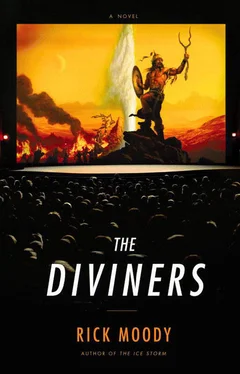“The gold rush was later.”
“Fool’s gold is perfectly serviceable. It matters only that I have re-created the anguished journey of Antonio Armijo and his band of sixty, men bent on the promise of the Pacific Ocean, about which they have heard so many things. They have heard of palm trees and coconuts, salacious women, they have heard of the vast western ocean, but here in the desert, they can see none of it. They can find only these glimmering minerals. They can read in the patterns of the rocks their own fates.”
“Aren’t you worried about snakes?”
“The water,” Ranjeet says, “is beneath the floor of the desert. And that is where Rafael Rivera emerges into the story. He is the diviner of rivers and he is an all-important member of the posse of Antonio Armijo. He comes from the ancient family of diviners, which stretches backward through time. Rafael is the finest scout in the history of the Spanish territories, but even so, no one believes he can find water in this parched region. No one knows exactly how he does it, as he has never allowed anyone to see him in the practice of his craft.”
It goes on like this, only more elaborately. Jeanine admires Ranjeet’s hard work and the way he remains kneeling in the sand. Here she is standing by the car, like the women of cinema, who are always to be found with their behinds against the passenger door, perfect hair blowing in the desert winds, each of these women wondering if she’s getting paid enough to offset the inevitable disappointment of life. In any road movie, you can be certain the actress would rather be back in the car than standing outdoors. Everyone would rather be back in the car, moving past the motels and the towns that are no more than a gas station and a general store and a few rusted pickup trucks.
“You could kiss me,” she says, advancing one tiny step away from the car, away from the eight cylinders and the mediocre gas mileage. “That was one of the reasons I came.”
Ranjeet looks up from his hunk of quartz. “I am a Sikh. According to my faith, I regard another man’s daughter as my own daughter and regard another man’s wife as my mother. I have coition with my wife alone. However, we will have a hotel room, to which we are entitled as contractors working for a large television network. In a flush of entitlement, we will embrace, even though I am a married man.”
“Do you have to keep bringing that part up?”
When she kissed Ranjeet by the subway after that uncomfortable dinner, because she was weeping over his son’s beauty and innocence, wasn’t it already apparent that she’d made a big mistake? Hadn’t she made a big mistake when she asked him to take off the turban? Hadn’t she made a mistake when she told her roommate that she’d found a man of honor who probably could do his own laundry and cook fabulous Indian cuisine? Hadn’t she made a mistake by forgetting the good advice about mixing the professional and the personal? Of course the real mistake is to spend five minutes in the condition of longing, because the minute you desire a thing, you and it are lost.
Ranjeet, dusting off his hands, rises, comes to her side, and holds open the car door for her.
The desert ends almost as if there’s a dotted border where the despoilation begins. There’s the desert, and then there are the cookie-cutter ranch houses of the greater metropolitan area and the billboards advertising the local spectacles: a pair of magicians with white tigers, topless dancers, the lowest interest rate of any pawnshop in the city. Jeanine can see the pox of the city in the distance. She can see the cartoon exaggerations of the casinos from here. The sun has dipped its fingertips in the wading pool beyond the horizon, and the chill of desert evening in early winter begins to overcome her. She can feel Ranjeet getting swept up into the gigantic con of the place. The strophes begin anew.
“What Benjamin Siegel recognized,” Ranjeet says, “was the great energy potential. What Benjamin Siegel knew was that every single citizen was either part of the spectacle or part of the audience. There are the two categories of persons, the entertainers and the entertained. According to Benjamin Siegel, his organized-crime syndicate needed to control the entertainment. Indeed, the spectacle must extend outward from a theatrical space until it engulfs the city surrounding! There must be a Strip! Benjamin Siegel came into this place after the right to gamble was secured, which is of course enshrined in your law, and he saw that there had to be spectacle. He did whatever he had to do to find the capital resources necessary to realize his dream, though to do so he lost himself, lost his fantasy to women and beverages which overflowed the very containers in which they were housed.” Then some more about mobsters and about Del Webb, former owner of the New York Yankees, who learned everything he needed to know from the hustle and vigor of the game of baseball.
They’re staying at the Luxor because the Luxor, with its pyramid and its sphinx, is designed to resemble the legal-tender dollar bill of the United States of America. The hotel is large enough to hold an army, and it is full, and people are ambling everywhere in the stunned thrall of casino visitors. It is impossible to feel that one belongs in a place like this, a place that is a giant toilet for flushing away the discernment of consumers. No matter where you go in this city, you pass the pit, and then you must hear the sound of the slot machines, that hypnotic tolling, promising the undeliverable, flushing you away.
The receptionist has a face like a gambler’s dream. Jeanine looks down the long console of the check-in desk, and there are ten or twelve of these women, all of them ripe with erotic promise or fiscal promise, at least until they graduate to the next echelon of global entertainment and power.
“We are here as guests of the Universal Beverages Corporation and, specifically, we are guests of Jeffrey Maiser, the head of network programming for the UBC network. I believe that the Universal Beverages Corporation owns a portion of this hotel, and therefore it is necessary that the luxury suite is to be complimentary for us, and that there will be complimentary chips for gaming purposes, and we are very grateful to accept this honor.”
The model/ actress scarcely blinks because she has heard it all before, every plea, every story. She has welcomed people of extreme penury, as well as arms traders and Saharan warlords. She excuses herself and goes down the line to speak to a manager, who stands by in a rakish suit. The two of them hover over a console, and then the model or actress returns. She brings the bad news. “We’re very sorry for the confusion, but we have no notification from Mr. Maiser or from anyone at Universal Beverages Corporation that your expenses are being taken care of. However, by way of apology, we’re willing to give you a room now, and some complimentary chips, to tide you over while we attempt to straighten out the situation. In the meantime, we’ll just need a credit card to secure the room. We’ll credit your account, of course, once we get the direct-billing issues resolved.”
Ranjeet writhes with discomfort.
“But we were told by one of Mr. Maiser’s staff people that we would be able to —”
“That may be true, of course, but we’ll need a major credit card, at least for the time being.”
Ranjeet looks at Jeanine, as if to plead, Don’t ruin my illusion. And yet Jeanine pretends not to understand this request, just so that she’s not a pushover. Then from her handbag she pulls the Means of Production corporate credit card. Ranjeet seizes the card, presents it to the hotel employee. The hurdle is hurdled, and they are off to the elevators.
Читать дальше












